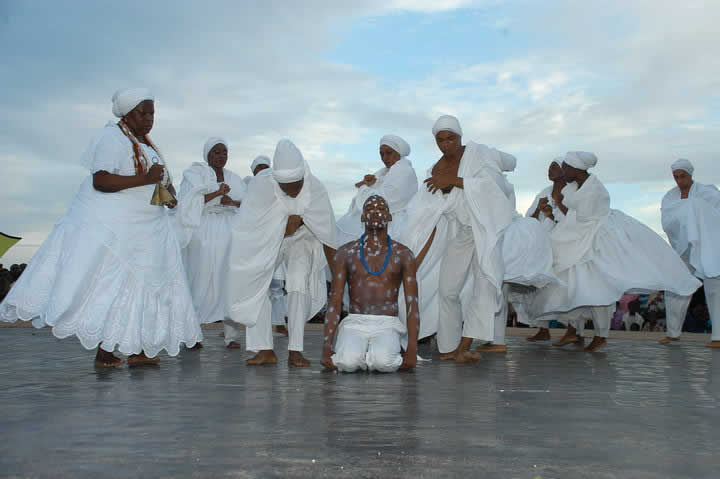In the heart of West Africa, nestled along the coast of the Gulf of Guinea, lies the ancient city of Aneho, Togo. This historic city, known for its rich culture and traditions, serves as the backdrop for a remarkable annual event that celebrates Africa’s historical personalities, discoveries, achievements, and eras. The “Festivals Des Divinites Noires,” or “The Festival of Black Deities,” is a vibrant tribute to voodoo, a spiritual practice with deep roots in the African continent.
Voodoo, a religion born in the lands of Benin (formerly Dahomey) and Togo, as well as in Kongo, later found its way to distant shores like Brazil, Cuba, the United States (notably Louisiana and New Orleans), and Haiti, where it thrived. Today, voodoo boasts approximately 80 million followers worldwide, spanning regions from Santo Domingo to Ghana, Nigeria, Cameroon, and Haiti.
One of the festival’s primary objectives is to provide a platform for Africans and those of African descent, living across the globe, to connect with their historical identity and promote African heritage. Acofin African Heritage Association, the driving force behind the “Festivals Des Divinites Noires,” views this celebration as a journey of memory, ownership, rehabilitation, and reclamation for African people everywhere.
Aneho, located just 45 kilometers from Togo’s capital, Lome, holds a special place in the history of voodoo. Together with neighboring towns in Benin, such as Abomey and Ouidah, Aneho is considered the cradle of voodoo in the world. Here, the Mina people, originally from Ghana’s Central regional town of Elmina, settled and continued their fishing occupation, enriching the cultural fabric of the region.
Aneho’s inhabitants, who speak both Ewe and Mina, as well as Togo’s major languages, Kabyè and Kotokoli, have preserved their ancestral worship with pride. The town’s historical significance, including its grandeur during colonial times when it outstripped Lome in size, is evident in the remnants of colonial-era buildings and architecture.
The Festival of Black Deities was established in 2006 by the Acofin organization. Its purpose has evolved over time to encompass meetings, exchanges, training, transmission of knowledge, exploration, and groundbreaking discoveries. Initially focused on traditional religions and initiation societies, the festival recognizes Africa’s wealth of initiation societies, from the men leopards in the Democratic Republic of Congo to the Dogon of Mali, the Senoufo people’s Poro initiation in Ivory Coast, Burkina Faso, and Mali, the Mossi of Burkina Faso, the Fang of Gabon, and the Kondonas Pya in Togo.
For seven consecutive years, the Festival of Black Deities has commenced in Glidji, a mere 10-minute drive from Aneho. Glidji, often referred to as the “Temple of traditional religions,” is hailed as the “Vatican” of voodoo. It is renowned for its temples, monasteries, high priests, priestesses, and the sacred forest, where insiders seek purity. Just like Ouidah in Benin, Glidji boasts sacred pythons revered by the people of the Guinea Coast and Africa. Each year, a ceremony to retrieve the sacred stone takes place in Glidji.
The organizers of the “Festivals Des Divinites Noires” are acutely aware that initiation rites and traditional practices are fading in the African continent. They firmly believe that ignoring or turning their backs on these traditions would be morally wrong. Their duty, they say, is to preserve this invaluable inheritance. Through the festival, they aim to reignite the significance of secret societies in Africa’s religious, socio-economic, and political well-being.
Acofin organization views the festival as an opportunity to celebrate initiation societies and traditional religions while passing down their wisdom to younger generations. They believe that these traditions are part of Africa’s “intangible heritage” and that it is essential for the younger audience to embrace their ancestral roots. In their words, “Yes, we love our heritage, we respect it, and we would like to save it. That’s why we have put it on stage.”
The “Festivals Des Divinites Noires” in Aneho, Togo, stands as a testament to the enduring spirit of African heritage, traditions, and enlightenment. It serves as a vibrant reminder of the importance of preserving and celebrating the rich tapestry of Africa’s history, even in the face of modernity and change.

